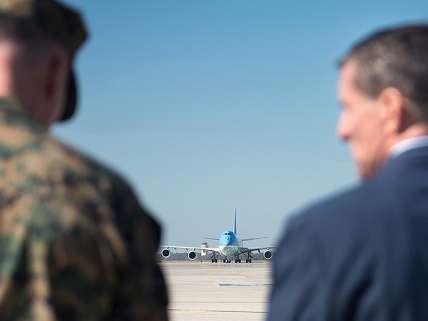Michael Flynn Resigns—Russian Concerns Over Trump Growing
Democrats say Flynn resignation just the beginning.

Michael Flynn, President Trump's national security advisor, resigned last night over a controversy about a phone call he made to the Russian ambassador to the U.S. in December. In his resignation letter, Flynn said he "inadvertently" provided "incomplete information" about phone calls to the ambassador—specifically, Flynn told Vice President Mike Pence and Reince Priebus, the White House chief-of-staff, he did not discuss sanctions with the ambassador even though he did. In its last days, the Obama administration imposed new sanctions on Russia over its alleged interference in the 2016 presidential election—Russia did not respond, and Trump called that a "great move" and Putin "very smart."
Late last month, the Department of Justice reportedly informed the Trump White House that Flynn had misled it about his call to the ambassador—the Washington Post reports that the message was delivered by Sally Yates, who Trump fired after she said she was not convinced the DOJ should defend Trump's travel ban executive order in court. It's unclear how the DOJ concluded Flynn was not being truthful about his phone call with the ambassador.
The Daily Wire's Ben Shapiro notes two possibilities for Flynn's deceit—that he misled Pence, Priebus, and Trump, or that he withheld the nature of his call to the ambassador from Pence and Priebus because Trump had not authorized him to disclose that information to others.
Congressional Democrats insist Flynn is "just the beginning" and are calling for hearings on the phone call. "It defies reason," Rep. Peter Welch (D-Vt.) said, according to The Hill. "People in that position don't do things without authorization." The House and Senate intelligence committees are already probing allegations of Russian interference in last year's election.
Russian policy makers and political elites, meanwhile, are growing more concerned about the Trump administration and U.S.-Russia relations, as Foreign Policy reports. Ivan Krastev and Stephen Holmes write that Russia's leadership is worried about trade wars, and that the Trump presidency also meant "Putin has lost his monopoly over geopolitical unpredictability." The two also report that Kremlin insiders may be most worried about Trump resigning, being removed from office, or even being killed, which would be "bound to unleash a virulent and bipartisan anti-Russian campaign" in the U.S. "Putin has become a hostage to Trump's survival and success," the two conclude, saying that that reality has restricted Russia's options on the international stage.
It's a far cry from November, when Russian leaders reportedly cheered the results of the U.S. presidential election. Russia preferred the unpredictability of Trump to the predictably aggressive stance Clinton had staked as secretary of state and was campaigning for president on. The hysteria whipped up by the American political elite over Russia's alleged influence on the election may yet exert enough pressure on the U.S. to keep its relations with Russia frosty. Russia's political elite, too, may be working toward that goal—Russia reportedly deployed a cruise missile in violation of a 1987 arms control treaty. It had test fired the missile back in 2014.


Show Comments (144)